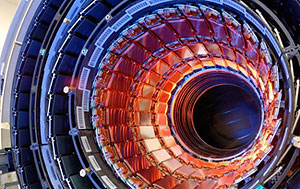Ru
|
Eng
Belarusian scientists suggest technologies to create Future Circular Collider
13.10.2014

Belarusian scientists suggest technologies to create the Circular Collider, BelTA learned from Professor Alexander Lobko, Doctor of Physics and Math, Deputy Director for Science of the Nuclear Problems Research Institute of the Belarusian State University, during the opening ceremony of the international conference on the engineering of scintillation materials and radiation technologies in Minsk on 13 October.
According to Alexander Lobko, a program to modernize the Large Hadron Collider in CERN is in development. The new project has been named Future Circular Collider (FCC). All the proposals concerning its improvement have to be ready by 2018. Plans have been made to increase the power of the particle accelerator up to 100 teraelectronvolts (TeV). The power of the current Large Hadron Collider is 14TeV.
The Nuclear Problems Research Institute of the Belarusian State University and the national center for research and education in the area of particle and high energy physics suggest new principles for detecting rapid signals, radiation-resistant materials, fast electronics for reading signals, and new principles to control clusters of ultrahigh energies using curved crystals, said Alexander Lobko. The scientists added that for now these proposals have to be verified, then tested by experiments and then they will be classified as technologies.
For the first time in Belarus the Belarusian State University is hosting the international conference on the engineering of scintillation materials and radiation technologies (ISMART 2014). The four-day forum has gathered over 100 researchers and developers, heads of leading international manufacturing companies in the area of nuclear instrument making. These specialists represent Belarus, Russia, Ukraine, Azerbaijan, Switzerland, and Estonia. The conference has been organized by the Nuclear Problems Research Institute of the Belarusian State University, the United Nuclear Research Institute (Dubna, Russia), and the Scintillation Materials Institute of the National Academy of Sciences of Ukraine.
The scientific forum uses a new format. Representatives of major Russian and Belarusian companies that make instruments for the nuclear industry take part in the event. The conference is expected to discuss a large number of matters ranging from high energy physics to diagnostics in healthcare and radiation safety systems.
According to Alexander Lobko, a program to modernize the Large Hadron Collider in CERN is in development. The new project has been named Future Circular Collider (FCC). All the proposals concerning its improvement have to be ready by 2018. Plans have been made to increase the power of the particle accelerator up to 100 teraelectronvolts (TeV). The power of the current Large Hadron Collider is 14TeV.
The Nuclear Problems Research Institute of the Belarusian State University and the national center for research and education in the area of particle and high energy physics suggest new principles for detecting rapid signals, radiation-resistant materials, fast electronics for reading signals, and new principles to control clusters of ultrahigh energies using curved crystals, said Alexander Lobko. The scientists added that for now these proposals have to be verified, then tested by experiments and then they will be classified as technologies.
For the first time in Belarus the Belarusian State University is hosting the international conference on the engineering of scintillation materials and radiation technologies (ISMART 2014). The four-day forum has gathered over 100 researchers and developers, heads of leading international manufacturing companies in the area of nuclear instrument making. These specialists represent Belarus, Russia, Ukraine, Azerbaijan, Switzerland, and Estonia. The conference has been organized by the Nuclear Problems Research Institute of the Belarusian State University, the United Nuclear Research Institute (Dubna, Russia), and the Scintillation Materials Institute of the National Academy of Sciences of Ukraine.
The scientific forum uses a new format. Representatives of major Russian and Belarusian companies that make instruments for the nuclear industry take part in the event. The conference is expected to discuss a large number of matters ranging from high energy physics to diagnostics in healthcare and radiation safety systems.
SCIENCE. TECHNOLOGY. INNOVATIONS
13.08.2024
28.06.2024
28.06.2024
25.06.2024
05.06.2024
15.05.2024
15.05.2024
26.04.2024
26.04.2024
26.04.2024













